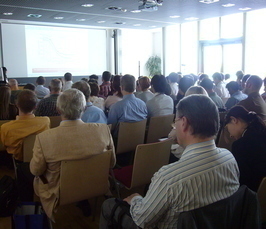VERSCHOBEN: MPI Kolloquiumsreihe: Prof. Dr. rer. nat. Michael H. Eikerling, Institut für Energie und Klimaforschung, Forschungszentrum Jülich
MPI Kolloquiumsreihe: Prof. Dr. rer. nat. Michael H. Eikerling, Institut für Energie und Klimaforschung, Forschungszentrum Jülich
- Datum: 19.03.2020
- Uhrzeit: 16:00 - 17:00
- Vortragende(r): Prof. Dr. rer. nat. Michael H. Eikerling
- Direktor, Institut für Energie und Klimaforschung , (Institute of Energy and Climate Research) IEK-13: Modellierung und Simulation von Werkstoffen in der Energietechnik (Modeling and Simulation of Energy Materials) Forschungszentrum Jülich GmbH
- Ort: Max-Planck-Institut Magdeburg
- Raum: Großer Seminarraum "Prigogine"
- Kontakt: sek-pcp@mpi-magdeburg.mpg.de

Dieses Kolloquium wird verschoben. Ein neuer Termin wird bekannt gegeben.
Das Max-Planck-Institut Magdeburg lädt Sie herzlich zu seiner öffentlichen Kolloquiumsreihe ein. Hochrangige WissenschaftlerInnen verschiedener Fachgebiete aus renommierten Forschungseinrichtungen aus Deutschland und weltweit präsentieren ihre Forschungsarbeit.
Abstract
The growing demand for highly efficient and environmentally benign energy technologies drives research on electrochemical materials. In this realm, theory, modeling, and simulation are contributing powerful methods and tools to study how complex multifunctional materials come to life during self-organization, how they live and work, and how they age and fail. The presentation will scrutinize a hierarchy of interrelated scientific challenges that determine cost, performance and lifetime of polymer electrolyte fuel cells. It will provide an account of recent advances in the development of first principles methods in electrocatalysis, the modeling and simulation of reaction conditions at mesoscopic interfacial regions between catalyst/support surface and ionomer skin layer, and the comprehensive modeling of complex water phenomena that couple processes across cell components and scales. The presented tools and analyses bolster efforts in materials selection, structural design and testing, as well as overall performance evaluation and improvement.